Syria. A Light in the darkness.
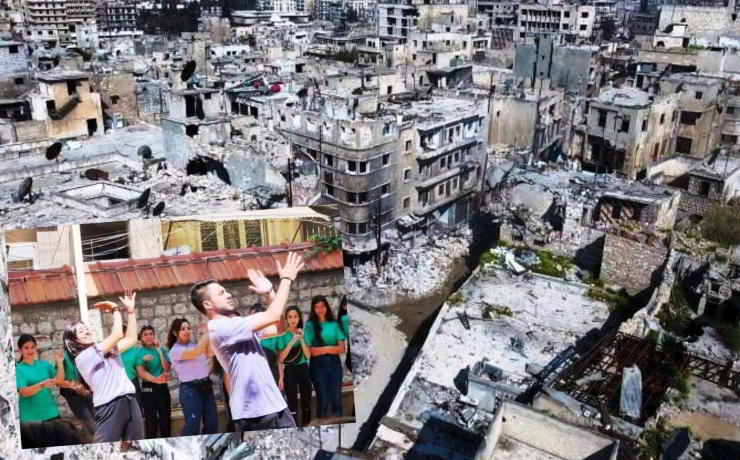
Thirteen years of war. The earthquake and the consequences of the conflict in Gaza. A forgotten country. The Church is still a point of reference for many people, as Father Bahjat Karakach, Latin parish priest of the Syrian city of Aleppo, tells us.
The voices of the children sound in the courtyard of the parish of Saint Francis, in the Al-Aziziyeh neighbourhood. A small oasis of serenity in the heart of Aleppo, where the little ones, more than anyone else, experience first-hand the suffering of a tormented city: a war that after thirteen years still cannot be said to be over and the devastating earthquake of February 2023, which continues to keep many
of them awake at night.
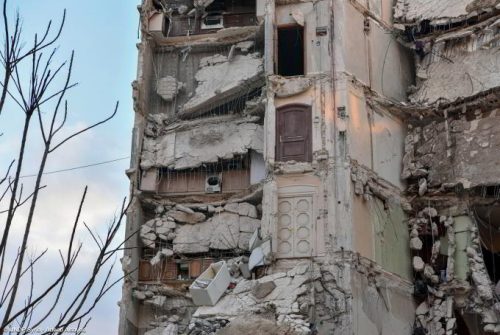
Destruction of buildings in Aleppo, Syria following the earthquake that hit Syria and Turkey on 06 February 2023. UNDP/Adeeb Alsayed
“Almost one and half year after the earthquake, there are children who cannot sleep alone,” says Father Bahjat Karakach, Franciscan parish priest of the Latin church. Which today also sees the spectre of the conflict in Gaza lengthening its shadow over an already exasperated population: “In recent months violence has crossed the country’s border several times and we all feel even more insecure. People are disheartened, they can’t see any future.”
It is difficult to do so, in a panorama of material destruction – given that the city has not yet been rebuilt, neither the part most affected by the war, nor the part devastated by the earthquakes – but also social and economic. Recently Geir Pedersen, United Nations special envoy to Syria, speaking to representatives of the Security Council, expressed deep concern for the regional situation and its repercussions in a nation where “unresolved conflicts, simmering violence and flare-ups of hostility are raging, each of which could be the focus of a new conflagration.”
In fact, in the countryside around Aleppo it happens that the drones launched by the anti-Assad rebels, barricaded for years in nearby Idlib, are now overlapped by missiles coming from Israel, which targets the interests and allies of the Iranians in the region. Meanwhile, people, caught in the middle of cross-conflicts, are focused on how to get to the end of the day, putting at least one meal on the table.
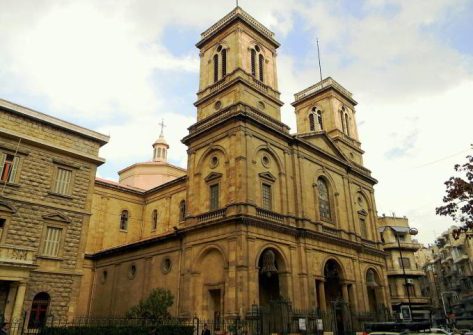
Church of Saint Francis of Assisi, Aleppo. CC BY-SA 3.0/ Preacher lad
“Syria is increasingly forgotten by the international community: at the beginning of this year the UN World Food Program itself cut its assistance interventions, stating that there are no more funds -Father Bahjat points out – but the needs of the people just increase. After the earthquake, there was a lack of viable houses and the price of rent doubled. Renting an apartment costs more than an average monthly salary, and unfortunately many find themselves without a roof over their heads.” Many others, being desperate, have decided to return to their homes, in partially destroyed buildings, in total insecurity: poverty leaves no alternative.The economic situation in the country is worrying: since 2020 the Syrian pound has suffered a 15-fold drop in value compared to the dollar and in the last year inflation has led to a doubling of food prices. And the production system, even in Aleppo which before the war was the commercial and industrial capital of the nation, has been fatally hit, while international sanctions paralyze any possibility of restarting. The State, for its part, is now absent: “From the school system to the health system, the institutions are unable to guarantee the functioning of basic services”, the Franciscan explains.
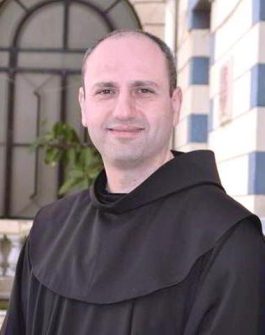
Father Bahjat Karakach, parish priest of Saint Francis. “Syria has been forgotten by the international community”. Facebook
The schools either no longer exist, because they have been reduced to rubble, or they do not function because the teachers do not have the means to reach the classrooms. It is often impossible for young people to continue their studies but also to attend professional institutes, with serious consequences for the job market: unemployment is growing and poverty is rampant. “And if you get sick, you can’t count on a welfare system: medical care has to be paid for, surgery has dizzying costs.”
How do people survive then? “Thanks to remittances from relatives abroad: now practically every family has at least one member who has emigrated. And then through the support of NGOs and humanitarian institutions. Today 80% of Syrians need some form of external help.”
“We, as the Church, are on the front line in various areas of material assistance, from the provision of meals to the support of young people up to the reconstruction of damaged houses”, says Father Karakach, a point of reference for the six hundred families of the parish of Saint Francis, but also of many others, in this city which was traditionally the most multi-ethnic and cosmopolitan in the country. “Several of our initiatives go beyond the walls of the church and reach all Syrians, without confessional distinctions. We have some projects in Muslim-majority neighbourhoods that had been occupied by militiamen and where today poverty and degradation are rampant. In addition to material help, we carry out psychological support interventions for orphaned, abandoned children or children of ex-combatants, also through artistic and sporting activities. And then we work for literacy: there are women who did not know how to read and today attend schools. Small signs of change that bring a breath of hope in a context of fatigue and worry.”
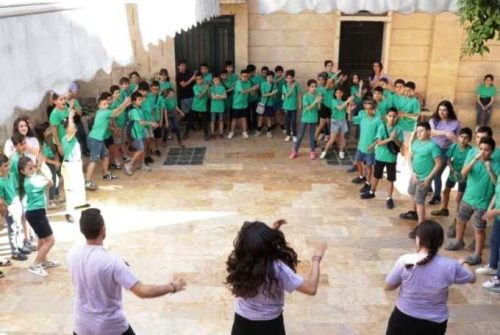
“The kids are incredibly alive and full of energy. They are the heart of our parish”. Facebook
For Father Bahjat, the Church today represents ‘a light in the midst of darkness’. In what sense? “Nowadays we Christians are few, yet, alongside ordinary pastoral work and social service to help Syrians live with dignity, we carry out an educational and reconciliation commitment which represents an important investment for the future of society. Working together, from below, is a way to break down the wall of mistrust and rebuild relationships.” Starting with the young people: “The kids are incredibly alive and full of energy. They are the heart of our parish: they follow the catechism, the scout groups, the psychological support interventions for the little ones. When faced with new projects, they are always ready to get excited and commit themselves, even though their lives are very complicated. Everyone, even those who continue their studies, must find a job, perhaps informal, to help the family: they tutor school lessons or do occasional jobs.”
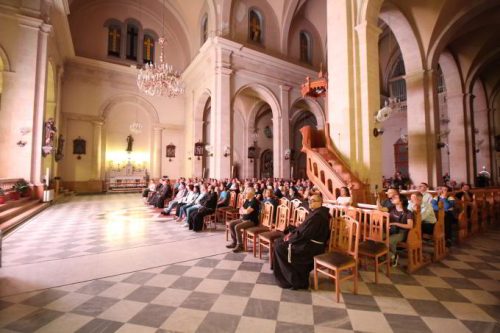
“We are a point of reference for the six hundred families of the parish of Saint Francis, but also of many others” Facebbok
Precisely for these young people, without prospects and tempted by emigration, the Franciscan friars promote micro-projects for those who aim to start an economic activity: “Many submit their proposals and then we select the most promising ones, providing the creators with training courses training on how to create and carry out a commercial project, whose launch we then support”.
Father Karakach, however, forcefully reiterates the need for the world to return to dealing with the future of Syria: “We do not want to be aid beggars forever and we have the tools to rebuild our country, but a solution is needed to the crisis which must involve the international community, which at times seems uninterested in stabilizing our territory.” The first concrete measure? “Remove economic sanctions, which not only increase people’s poverty, but create fertile ground for corruption and illegality. The Syrians are exhausted from the war, they would like to finally turn the page.” (Open Photo: the city of Aleppo, aerial view. Shutterstock/Fly and Dive)
Chiara Zappa/MM



